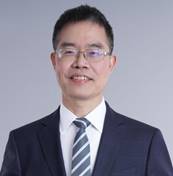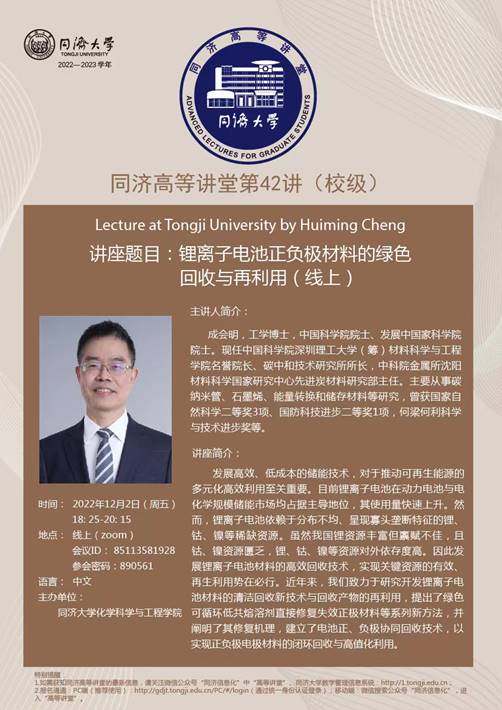Topic: Green Recycling of Cathode & Anode Materials for Lithium-ion Battery
Lecturer: Cheng Huiming (Academician at the Chinese Academy of Sciences, Academician at the World Academy of Sciences for the Advancement of Science in Developing Countries)
Time: 18:25-20:15, December 2, 2022 (Friday)
ZOOM Meeting: 85113581928 (password: 890561)
Inviter: Professor Zhang Chi
About the Lecturer:

Cheng Huiming,Doctor of Engineering, Chair Professor, an academician at the Chinese Academy of Sciences and the World Academy of Sciences for the Advancement of Science in Developing Countries. He graduated from Hunan University with a bachelor's degree in 1984, and received a master's degree and a doctor's degree (a joint education program with Japan) from the Institute of Metal Research, Chinese Academy of Sciences in 1987 and 1992. Currently serving as the Honorary Dean of the Institute of Advanced Materials Science and Engineering, Director of the Institute of Technology for Carbon Neutrality of Shenzhen Institutes of Advanced Technology (under preparation), Chinese Academy of Sciences, the Director of the Advanced Carbon Division of Shenyang National Laboratory for Materials Science, the Institute of Metal Research, Chinese Academy of Sciences, and Distinguished Visiting Professor of Tsinghua Shenzhen International Graduate School, he has mainly engaged in the research of carbon nanotubes, graphene, energy conversion and storage materials, etc.; has delivered more than 230 invited lectures at domestic and international academic conferences and published more than 880 papers (H-factor of 152), among the internationally highly-cited researchers in the fields of chemistry and materials; has been granted more than 200 invention patents; has initiated the many high-tech companies based on the applications of graphene, two-dimensional hexagonal boron nitride, high-performance graphite materials and other techniques. He has won the National Natural Science Award (3 second prizes) and the National Defense Science and Technology Progress Award (1 second prize), as well as the Ho-Leung-Ho-Lee Prize on Science and Technology Progress, the Charles E. Pettinos Award of the United States, the Felcht Award of Germany, the American Chemical Society (ACS) Nano Lectureship Award of the United States and others. He previously served as the Associate Editor-in-Chief ofCarbonand the Editor-in-Chief ofNew Carbon Materials,and now is the Founding Editor-in-Chief ofEnergy Storage Materialsand the Associate Editor-in-Chief ofScience China Materials.
Lecture Profile
The development of efficient and low-cost energy storage techniques is crucial to promoting the diversified and efficient use of renewable energy sources. Lithium-ion batteries take a dominating position in the power battery and electrochemical large-scale energy storage markets, with rapidly expanding applications. However, lithium-ion batteries rely on scarce resources such as lithium, cobalt and nickel that are unevenly distributed and in oligopolistic markets. Although China is rich in lithium resources, it is not well endowed, and is lacking in cobalt and nickel resources, and is even highly dependent on the import of multiple resources, including lithium, cobalt, nickel. Therefore, it is imperative to develop efficient recycling techniques for key resources of lithium-ion battery materials. Our team has been devoted to the research and development of new techniques for the clean recycling of lithium-ion battery materials and the reusing of recycled products in recent years, proposed a series of new methods such as direct repair of failed cathode materials with recyclable deep eutectic solvents, backed by the repair mechanism revealed, and established the synergetic recycling technique for battery cathodes & anodes targeting closed-loop recycling and high-value utilization of cathode & anode materials.

Tongji Advanced Lecture 42 (University Level) |
Lecture at Tongji University by Huiming Cheng |
Topic: Green Recycling of Cathode & Anode Materials for Lithium-ion Battery (Online) |
About the Lecturer: |
Cheng Huiming, Doctor of Engineering, an academician at the Chinese Academy of Sciences and the World Academy of Sciences for the Advancement of Science in Developing Countries. Currently serving as the Honorary Dean of the Institute of Advanced Materials Science and Engineering, Director of the Institute of Technology for Carbon Neutrality of Shenzhen Institutes of Advanced Technology (under preparation), Chinese Academy of Sciences, the Director of the Advanced Carbon Division of Shenyang National Laboratory for Materials Science, the Institute of Metal Research, Chinese Academy of Sciences, he has mainly engaged in the research of carbon nanotubes, graphene, energy conversion and storage materials, etc.; has won the National Natural Science Award (3 second prizes) and the National Defense Science and Technology Progress Award (1 second prize), the Ho-Leung-Ho-Lee Prize on Science and Technology Progress, and others. |
Lecture Profile: |
The development of efficient and low-cost energy storage techniques is crucial to promoting the diversified and efficient use of renewable energy sources. Lithium-ion batteries take a dominating position in the power battery and electrochemical large-scale energy storage markets, with rapidly expanding applications. However, lithium-ion batteries rely on scarce resources such as lithium, cobalt and nickel that are unevenly distributed and in oligopolistic markets. Although China is rich in lithium resources, it is not well endowed, and is lacking in cobalt and nickel resources, and is even highly dependent on the import of multiple resources, including lithium, cobalt, nickel. Therefore, it is imperative to develop efficient recycling techniques for key resources of lithium-ion battery materials. Our team has been devoted to the research and development of new techniques for the clean recycling of lithium-ion battery materials and the reusing of recycled products in recent years, proposed a series of new methods such as direct repair of failed cathode materials with recyclable deep eutectic solvents, backed by the repair mechanism revealed, and established the synergetic recycling technique for battery cathodes & anodes targeting closed-loop recycling and high-value utilization of cathode & anode materials. |
Time: December 2, 2022 (Friday) |
18: 25-20:15 |
Venue: online (zoom) |
Meeting ID: 85113581928 |
Password: 890561 |
Language: Chinese |
Organized by: |
School of Chemical Science and Engineering, Tongji University |
Special Reminders: |
1. For the latest information on Tongji Advanced Lecture, please follow the WeChat official account "Tongji Informatization" and check for updates in the "Advanced Lecture", or log into the teaching management information system of Tongji University: http://1.tongj.edu.cn; |
2. Registration: http://gdjt.tongj.edu.cn/PC/#/login( login through unified identity authentication) for PC terminals (recommended); search for the official account "Tongji Informatization" on WeChat and make a registration in the "Advanced Lecture" for mobile terminals. |